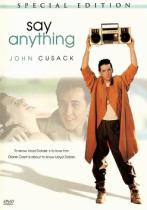Say Anything...
 Year:
Year: 1989
Film Studio: Twentieth Century Fox, Gracie Films
Genre: Comedy, Romance
Length: 100 Min.
DirectorCameron Crowe (1957)
WritingCameron Crowe (1957)...Written By
ProducerJames L. Brooks (1940)
Paul Germain (1959)
Richard Marks (1943)
Polly Platt (1939)
CinematographerLászló Kovács (1933)
MusicAnne Dudley (1956)...Composer
Richard Gibbs (1955)...Composer
StarsJohn Cusack (1966) as Lloyd Dobler
Ione Skye (1971) as Diane Court
John Mahoney (1940) as James Court
Lili Taylor (1967) as Corey Flood
Amy Brooks (1971) as D.C.
Pamela Adlon (1966) as Rebecca
Jason Gould (1966) as Mike Cameron
Loren Dean (1969) as Joe
Review John Cusack appeared in a LOT of teenage angst and comedy films during the 1980’s, and he closed out the decade in the best of them all,
Say Anything. Written and directed by Cameron Crowe,
Say Anything attains the one thing all the films in this exploited genre failed to achieve; believability. Cusack plays Lloyd Dobler, a young adolescent graduating from high school, who sets his eye on the class valedictorian, Diane Court (Ione Skye). Intellectually they are miles apart, but from a karmic standpoint, they are truly meant for each other. While Diane is knowledgeable about all things encyclopedic, Lloyd is soft-spoken, streetwise and sentimental in his approach to the vagaries of a teenager’s life on the heels of impending adulthood. Diane has charted her course through the future with a certainty that is far removed from Lloyds
‘one day a time’ principle. Which becomes evident when Lloyd is invited to Diane’s graduation party at the Court residence. When he is asked what his plans are for the future, Lloyd responds in a perplexing, yet prophetic manner;
“I don't want to sell anything, buy anything, or process anything as a career. I don't want to sell anything bought or processed, or buy anything sold or processed, or process anything sold, bought, or processed, or repair anything sold, bought, or processed. You know, as a career, I don't want to do that”. For the moment, his only concern, his only purpose, is to be with Diane and to take what fate deals out to him.
The one impediment to their blissful arrangement is Diane’s father, James Court (John Mahoney). A divorced single parent who has done whatever it takes to insure that his daughter’s life is kept on the straight and narrow path to perfection. Although he doesn’t dislike Lloyd, he can see that the young man may distract Diane from achieving everything she wants in life, all for a momentary bit of romance. He persuades Diane to break it off now, before the relationship becomes too deeply rooted. Heeding her father’s advice, Diane breaks the news to the bewildered Lloyd, who can’t understand what went wrong. Lloyd tries in vain to set things right with Diane, by writing, phoning and even blaring Peter Gabriel’s
In Your Eyes on a boom-box outside her window. It’s in these attempts at reconciliation that the film attains its authenticity, as the pain that Lloyd is feeling is genuine and heartfelt. There are no clichéd scenes of cloying sentimentality or comedic episodes of desperation to bog down this well written screenplay. The strength of which lies in the verbal repartee between Lloyd and his supporting cast of friends, who try to give the disillusioned young man varied bits of wisdom to help him cope with his situation. When Lloyd states to his friend Corey (Lili Taylor),
“I’m a guy, I have my pride”, the insight that she imparts to him,
“The world is full of guys…be a man!” rings the truth that transcends the atypical approach made by similar films of a lesser pedigree.
If you are only familiar with John Cusack from films such as
Better off Dead,
The Sure Thing or
One Crazy Summer, you owe it to yourself to see the film that helped him graduate from teen oriented comedies and set him on the path to acting adulthood.
Ratings Criterion5 Stars - The pinnacle of film perfection and excellence.
4 ½ Stars - Not quite an immortal film, yet a masterpiece in its own right.
4 Stars - Historically important film, considered a classic.3 ½ Stars - An entertaining film that’s fun or engaging to watch.
3 Stars – A good film that’s worth a Netflix venture.
2 ½ Stars - Borderline viewable.
2 Stars – A bad film that may have a moment of interest.
1 ½ Stars – Insipid, trite and sophomoric, and that's its good points.
1 Star – A film so vacuous, it will suck 2 hours from the remainder of your life.
½ Star - A gangrenous and festering pustule in the chronicles of celluloid.